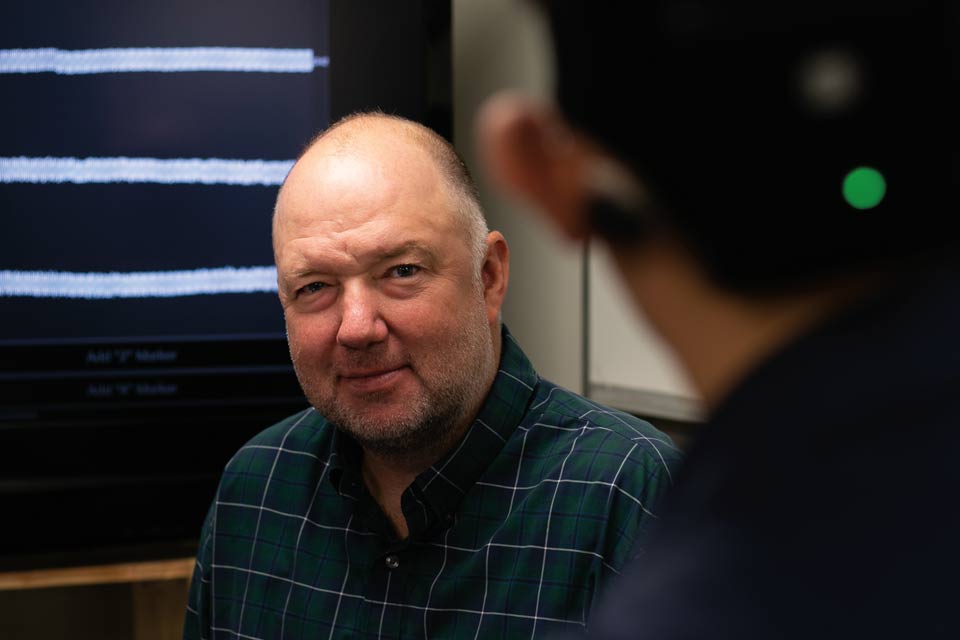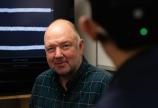Diagnosis on the double
- Jenny Manzer

UVic neuroscientist Olav Krigolson is investigating a mobile test to rapidly flag cognitive impairment—potentially leading to diagnosis years earlier than current practice.
Olav Krigolson is not afraid to celebrate his nerd origin story. In his TEDx talk, the UVic neuroscientist speaks about his love of comic books, his childhood yearning for X-ray vision glasses and hours spent watching Star Trek. But he disagrees with the sci-fi show’s premise, voiced in the opening credits, that space is the final frontier.
“I believe the brain is the final frontier,” he says in the talk, posted in May of this year.
After completing an Education degree at UVic, Krigolson became so captivated by the potential of the brain that he ditched plans to teach high school and coach basketball and went back to the books, earning his PhD at UVic. Since then, he has delved into the possibilities of decoding the brain’s signals to better understand how it works and what happens when it’s not performing well. He does this by measuring brain activity using a mobile EEG (electroencephalogram) device. These devices can take the form of glasses or a headband—all readily available for purchase at electronic stores.
Krigolson then creates algorithms to find the associations between the EEG findings and certain brain conditions. In other words, he does the math, decoding the complex relationships in the patterns of the EEG waves. Krigolson and his team have already applied this technology to study cognitive fatigue in health care workers and in would-be astronauts destined for a space mission to Mars.
The current study, conducted in collaboration with Island Health neurologist Dr. Alexandre Henri-Bhargava, looks at whether the headband tech can be used to flag Mild Cognitive Impairment (MCI). The team found that it can—and is currently preparing the study of 40 subjects for publication.
Krigolson says they already know the mobile devices work to measure brain waves. He notes that if you can measure brain waves off an iPhone or iPad in a couple of minutes, that’s a huge time savings over the traditional scan.
“That’s how this project was born, this idea that ‘Could we develop a five-minute test?’ You could imagine you’d show up at the doctor’s office, you put on the headset—it takes about a minute to put on—you do the test off of an iPad. And in five minutes your doctor has got some information that ‘Hey, maybe we need to follow up on this person,’ or ‘No, everything looks great.’ That was the starting point for this.”
Co-investigator Henri-Bhargava, an affiliate associate professor at UVic in the Division of Medical Sciences, says the test could potentially be regarded as a “blood-pressure cuff for the brain.” The portable EEG could be simply administered in the primary-care setting, perhaps by a nurse, medical-office staff, or an occupational therapist.
While certain signs of dementia can be seen on a brain scan, it’s not feasible to have patients undergo an MRI every year—the resource is expensive and in demand. But a mobile EEG can be done in just a few minutes with a series of simple games. Then, the patient has a baseline result to be used as a comparison in future tests. The mobile test would not diagnose, necessarily, but be part of a package of information, likely including a brain scan.
Doctors currently use pen-and-paper clinical questionnaires to flag problems—but these take time. The mobile test could provide a rapid assessment.
Can the EEG give us a physiological measure that can help us understand whether somebody has various stages of cognitive impairment that can give us more information than just the pen-and-paper test?”
—Dr. Alexandre Henri-Bhargava, UVic Division of Medical Sciences
There is no cure for dementia, but you can delay or slow the onset. The earlier it’s diagnosed, the better quality of life for a longer time, observes Krigolson. “You can make life better for a little bit longer.”
Henri-Bhargava says diagnosis is important for a number of reasons. “There are treatments that can help with symptoms. There are also a whole host of educational processes that you can put in to help patients and families to deal with the condition and avoid a series of emergency or crisis visits down the line.”
He also hopes the method, in addition to potentially being faster and offering greater specificity, could make it easier to explain the diagnosis to patients, who may regard it as more valid than a paper quiz. Dr. Henri-Bhargava acknowledges a history of “strike-outs” in developing new medications for dementia—but says the non-invasive EEG test could be extremely useful in testing new therapies because it could offer the ability to track patients over time.
The team expects the pilot study of 20 patients with cognitive impairment and 20 controls to be completed by the end of this year. They hope in future to do a larger study and use brain imaging to test and amplify the findings.


